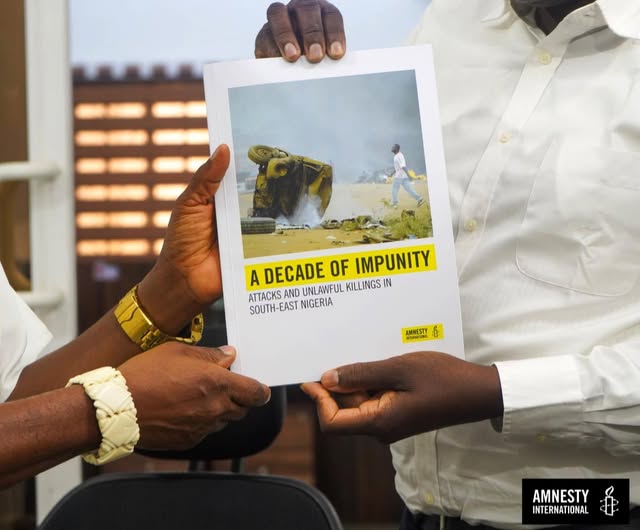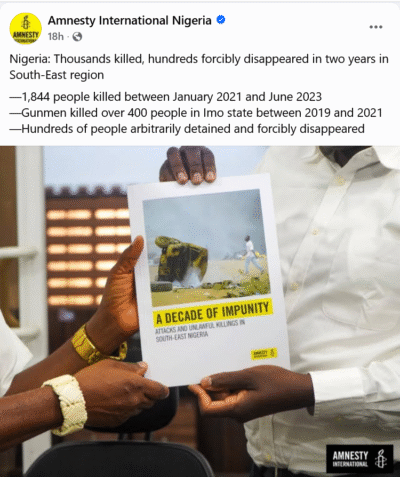
Nigeria’s Southeast Bleeds: Amnesty International Says Over 1,800 Killed, Hundreds Disappeared in Two Years
A storm of blood, silence, and impunity as government forces and gunmen unleash terror across the region.
Abuja, Nigeria – October 7, 2025
A chilling post published yesterday by Amnesty International Nigeria on its official Facebook page has reignited public outrage over the ongoing wave of killings and enforced disappearances in Nigeria’s South-East.
The organization recalled findings from its August 2025 investigative report titled “A Decade of Impunity: Attacks and Unlawful Killings in South-East Nigeria,” revealing that at least 1,844 people were killed between January 2021 and June 2023, while hundreds remain missing after arbitrary arrests and secret detentions.
Amnesty’s findings paint a grim picture of a region trapped in blood and fear, where violence has become routine and justice a distant dream. The report accuses both non-state armed groups and government forces of widespread human rights violations, including unlawful killings, torture, house burnings, and the forced disappearance of civilians.
A Decade of Violence and Impunity
According to the report, the violence in the South-East, covering states such as Imo, Anambra, Abia, Enugu, and Ebonyi, has steadily escalated since 2021. Amnesty documented that not less than 1,844 civilians lost their lives in less than three years, mowed down at the hands of security forces, gunmen, and vigilante units.
In Imo State alone, over 400 people were killed between 2019 and 2021 by unidentified gunmen. Entire communities were razed, markets destroyed, and homes left in ashes. Villages once filled with laughter now stand as silent memorials to those lost.
The human rights organization describes the situation as “a humanitarian catastrophe sustained by government neglect, criminal opportunism, and military brutality.”
Security Forces or Execution Squads?
The report highlights disturbing patterns of abuse by state agents. Witnesses told Amnesty that security operatives, particularly the police, military, and the Ebube Agu paramilitary force, routinely conduct raids that end in mass arrests, torture, and extrajudicial executions.
Eyewitnesses recounted how security agents stormed neighborhoods at night, detaining young men under the pretext of searching for members of the Indigenous People of Biafra (IPOB). Many were never seen again. Families searching for their loved ones are often met with silence or intimidation.
“The government has turned the fight against insecurity into a license to kill,” one resident of Orlu, Imo State, told Amnesty researchers. “People are either shot by gunmen or disappeared by soldiers, there’s no safe side anymore.”
Gunmen, Cults, and Criminal Networks
Amnesty also traced part of the violence to armed groups locally referred to as “unknown gunmen.” These groups, often emerging from forest camps, have been linked to killings, arson attacks, and enforcement of “sit-at-home” orders. In some cases, cult groups and criminal gangs collaborate or exploit the chaos for ransom and control.
The report underscores that while non-state actors contribute to the violence, and the Nigerian state’s response has only deepened the crisis through collective punishment, indiscriminate shootings, and destruction of civilian property.

Lives Lost, Voices Silenced
The scale of human suffering is staggering. Hundreds have vanished, victims of enforced disappearance, according to Amnesty. In many communities, families now live with a haunting question: Where is my son? Where is my husband?
Some of the detained are held in secret military facilities. Others are found dead weeks later in shallow graves. The fear is so pervasive that many residents avoid traveling, attending gatherings, or even reporting abuses. Amnesty’s report notes that funerals and weddings have become high-risk events in parts of the region.
“Entire communities are living under siege,” Amnesty International said. “Civilians are caught between criminal gangs and a state that should protect them but instead terrorizes them.”
Silence and Denial
The Nigerian government has yet to respond meaningfully to Amnesty’s findings. Despite repeated documentation and submissions, no credible investigation has been launched, and no official accountability mechanism has been established.
Instead, authorities continue to dismiss reports of human rights violations as “propaganda” or blame them on “fake news,” while the killings continue. Amnesty International insists that this silence represents a dangerous normalization of impunity.
Amnesty’s Call to Action
In its August report, Amnesty called on the Nigerian government to immediately end enforced disappearances, ensure transparent and independent investigations into all alleged abuses, and prosecute perpetrators, whether state officials or armed actors.
It also urged the authorities to criminalize enforced disappearance under Nigerian law and provide reparations to victims and their families.
Without accountability, Amnesty warns, “the cycle of blood and silence will only deepen.”
What is happening in Nigeria’s South-East is no longer a conflict; it is a slow-motion genocide of neglect.
Thousands of lives extinguished, hundreds vanished without a trace, and a government more interested in denial than justice.
The people cry for protection, but their pleas echo into a void.
Until accountability becomes the policy of the Nigerian state, the ground of the South-East will remain soaked with the blood of its own people.